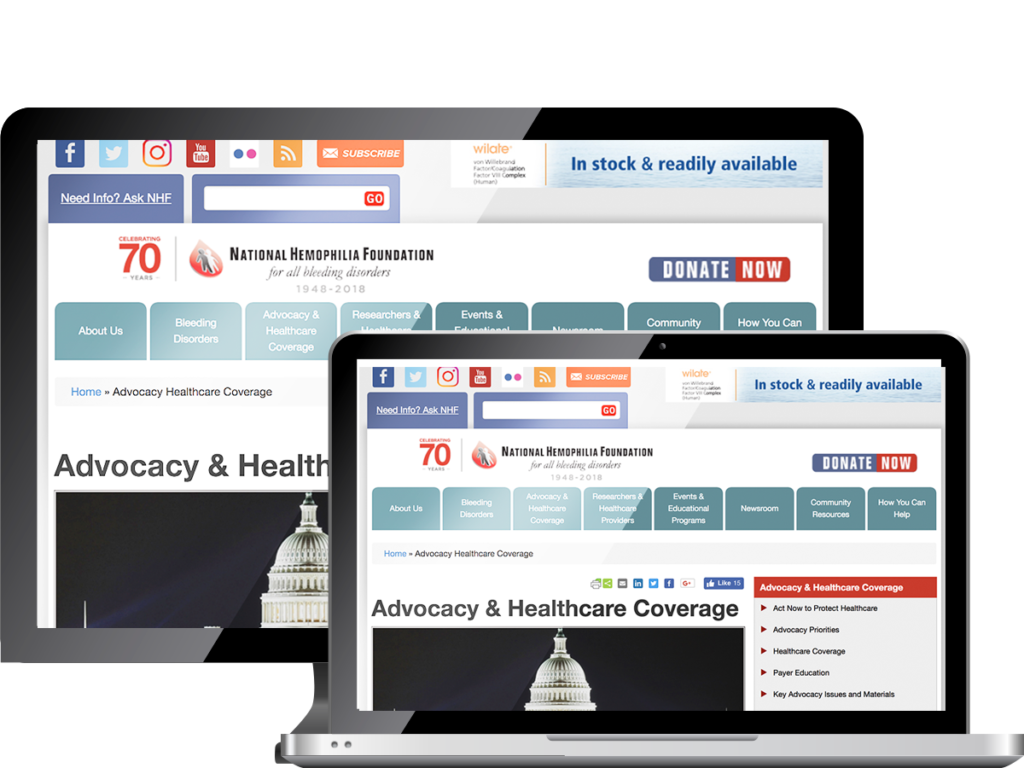Advocacy
HFM works to increase and maintain access to lifesaving medication and quality and affordable healthcare for bleeding disorder patients in the state of Michigan.
HFM ADVOCATES FOR PATIENTS
HFM works to increase and maintain access to lifesaving medication and quality and affordable healthcare for bleeding disorder patients in the state of Michigan. We are currently monitoring the following issues in Michigan.
HFM monitors any changes in health plans that may increase the burden of cost-sharing for patients. Since clotting factor is a high-cost drug, many insurers and pharmacy benefit managers are working on ways to manage or reduce the cost they pay for these drugs.
COPAY ACCUMULATOR ADJUSTER PROGRAMS
Copay assistance is financial assistance typically provided by drug manufacturers or nonprofit organizations to help Michigan patients afford their medication and health care services.
Insurers have created programs called copay accumulator programs that prevent copay assistance from counting towards a patient’s deductible or maximum out-of-pocket requirement. Insurers collect copay assistance, but once it runs out, they still require the patient to pay the full deductible and out-of-pocket costs.
Copay accumulator programs increase patients out-of-pocket costs. Patients are far more likely to abandon their treatment when out-of-pocket costs exceed $100. Health care spending on emergency visits, hospital stays, and avoidable procedures increases when patients cannot afford treatments to manage their chronic disease.
Critical reform will help patients access critical treatment by ensuring all payments made by the patient or on behalf of the patient count towards the patient’s annual deductible and out-of-pocket costs.
21 states, the District of Columbia, and Puerto Rico have already passed legislation to stop this discriminatory practice and protect patients. Michigan patients should be, too.
The Michigan All Copays Count Coalition has been working for the past four years to pass legislation to reform copay accumulators in Michigan.
Learn more about copay accumulator legislation in Michigan and how you can support the efforts via the Michigan All Copays Count website.
Step therapy is an insurance cost-saving strategy enacted by private health plans and private Medicare drug plans. Before a plan will cover some (generally more expensive) drugs, they require you to try other (generally less expensive) drugs that also treat the condition. Sometimes referred to as “fail-first” policies, patients must fail on these cheaper or preferred medications, before their insurer will cover their doctor prescribed medication. The bleeding disorders community maintains that step therapy should not be used when prescribing clotting factor. Biologics products are not therapeutically equivalent and should be prescribed by hemophilia-specialists who have a strong relationship with their patients.
For bleeding disorder patients, the consequences of a treatment “failure” are extremely serious. The risks of a major bleed, or of cumulative damage from repeated bleeds, are too high to expose hemophilia patients to potentially ineffective treatments, or to delay their access to the therapies prescribed by their doctors.
HFM is a member of the Health Can’t Wait coalition that is working to pass step therapy and prior authorization reform legislation in the state. To learn more about this effort, visit www.healthcantwait.org.
Children’s Special Health Care Services (CSHCS) is a program within the Michigan Department of Health and Human Services, administered under Title V of the Federal Social Security Act. It was created to find, diagnose, and treat children and some adults in Michigan with chronic health care needs. CSHCS is committed to removing barriers to appropriate health care and may be able to help with paying specialty medical bills, covering insurance co-pays and deductibles for private insurance, helping families to keep private insurance, and addressing transportation needs for medical care.
As of October 1, 2023, CSHCS will expand eligibility for the program to age 26 for individuals with a qualifying medical condition. However, the age limitation is waived for patients with certain blood disorders (hemophilia and other bleeding disorders), Sickle Cell Disease, and Cystic Fibrosis. Families of all incomes are eligible to join, including those with other health insurance including Medicaid–though there may be a yearly fee to join CSHCS based on family income and family size. Visit www.michigan.gov/cshcs or call the CSHCS Family Phone Line at 800-359-3722 for more information.
CSHCS’s funding can change yearly. The program is funded through a combination of federal (Title XIX and Title V) funds, as well as state general funds. While Title V funds are capped, state general funding levels may vary based on the state budgetary needs. Additionally, language providing adult coverage must be maintained in the annual appropriations bill each year to ensure access for our adult population. In 2005, the Granholm Administration proposed eliminating coverage for cystic fibrosis and hemophilia adults in the Title V program. The bleeding disorders community organized an effective campaign against the proposal and successfully saved the adult coverage.
If you have questions about your medications or insurance, please talk to your Hemophilia Treatment Center. Everyone has a unique situation based on his or her diagnosis, insurance benefits, and provider–your HTC will be best able to answer your personal questions.
People living with hemophilia and other bleeding disorders rely on high cost medications in order to live healthy and productive lives. Patient protections included in the Affordable Care Act work to limit the impact these costs have on people living with bleeding disorders. The annual cap on out-of-pocket costs places a dollar limit on the amount insurers can charge a patient in any given year. The maximum out of pocket limit for a family for 2023 is $18,200, and $9,100 for an individual. However, this does not include monthly premiums. In total, this spending can place a serious financial burden on families.
HFM continues to work to ensure patients are able to afford their live-saving medications without experiencing a financial burden.
If you are in need of premium assistance, contact your hemophilia treatment center social worker to learn what help is available.
HFM believes that greater access to health insurance is the best way to improve patients’ adherence to their treatment, which in turn improves patients’ health outcomes and the overall cost of care decreases. After Michigan expanded Medicaid to childless adults between 100-138% of the federal poverty limit, 600,000 Michiganders gained coverage.
States continue to have concern regarding the rising cost of health care, which is rising faster in state Medicaid programs than commercial insurance. HFM continues to monitor the Michigan Medicaid program to ensure any changes to manage the budget do not disrupt access to care.
HFM is also monitoring access to prescription drugs in Medicaid. Other states have made changes to their preferred drug lists that restrict the availability of certain factor products. Michigan currently covers all factor products through Medicaid fee-for-service. Though there were discussions about moving bleeding disorder treatments to Managed Care, the medications remained on FFS. HFM monitors any change to Medicaid’s drug coverage and will share updates if they should occur.

Lansing Days
Lansing Days, HFM’s annual state legislative day, provides an opportunity for constituents to educate their legislators on the needs and special interests of the bleeding disorders community.

Have you Registered to Vote?
YOUR VOTE MATTERS!
Use your voice as a bleeding disorders advocate.
Join
HFM's Action Network
Support HFM in protecting the bleeding disorders community and sign up for action alerts.

in the news
Get the latest HFM Advocacy News and Updates
October 15, 2026 Save the Date for an Advocacy Webinar
August 13, 2026 Save the Date for an Advocacy Webinar
March 24-25, 2026Lansing Days

Learn more about federal issues at the Hemophilia Federation of America and the National Bleeding Disorders Foundation
There are a multitude of policy issues facing the bleeding disorders community.
HFA and NBDF support the community by providing information and tools to participate in monitoring, advocating, and supporting federal and state public policies that impact the lives of people living with bleeding disorders.


